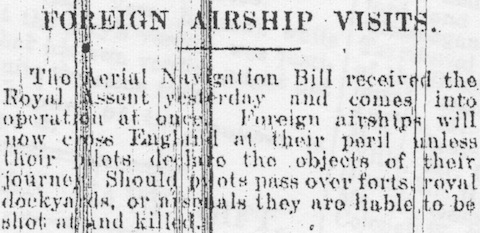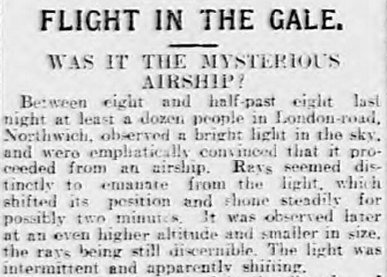
The Aerial Navigation Bill, introduced into the House of Commons only a week ago, is now the Aerial Navigation Act, 1913, as the Daily Mail records (p. 5; above):
The Aerial Navigation Bill received the Royal Assent yesterday and comes into operation at once. Foreign airships will now cross England at their peril unless their pilots declare the objects of their journey. Should pilots pass over forts, royal dockyards, or arsenals they are liable to be shot at and killed.
The terms of the new Act will be communicated at once to foreign Governments, also the regulations to be made by the War Office. Aircraft passing prohibited places will be warned by smoke signals before they are fired at. Rockets or flash lights will be used at night.
The Standard‘s parliamentary reporter, John Foster Fraser, reports the granting of the Royal Assent in picturesque terms (p. 6):
A pleasant interlude in the shape of a call to the House of Lords broke the rather drab current of the Commons’ proceedings. The faithful Commons were called to the House of Peers to hear the reading of a broad, cracking sheet of vellum announcing that the King, under the Great Seal, had commissioned a group of peers to signify the royal assent to a little batch of Bills. So, in solemn ceremonial, the Aerial Navigation Act, with its power to authorise the shooting of aeroplane fly-by-nights, became the law of the land.
As this kind of pomp and ceremony presumably happens on a regular basis, it’s difficult to see why it needs to be recounted with this level of detail. Perhaps it’s a slow news day.
A leading article in the Irish Times (Dublin) welcomes the new Act (p. 6) because
it will strengthen the hands of the Government in dealing with flying craft of all kinds. More especially, it gives greater control over foreign ships, such as have been reported on the coasts of Great Britain lately.
It cites further evidence that ‘the authorities are waking up to the importance of the new science of flying’, for example
The departure of a detachment of Army aeroplanes from Farnborough last Thursday to fly to Montrose, where a new station has been established, marks an important advance in the development of military aeronautics. A number of these outlying stations are being formed, to which graduates of the Central Flying School at Upavon will be sent after their training has been completed at Farnborough.
Yet Britain ‘still lags far behind other countries’:
She has nothing which can compare for a moment with the German fleet of Zeppelin airships. These are large and powerful vessels, with considerable carrying capacity. They can fly both far and fast, and are capable of dealing out destruction by means of guns and bombs. They are thus capable of taking the offensive, and of invading foreign countries with considerable effect.
And its island nature will be little protection:
Soon an invasion from the air will be more than a possibility; it will become just as obvious a method of attack as the sea is now. We do not for a moment suggest that there is any immediate danger. Our relations with foreign countries are far too good to give any cause for extreme or alarming views. But good foreign relations are never such an efficient protection as the power to repel attack. England has been found unprepared before now, and has survived, but in the near future conditions will be so changed that unreadiness will be very severely punished.
The Scotsman (Edinburgh) likewise supports the Aerial Navigation Act (p. 8), but thinks it insufficient in itself:
The necessity of such a provision [to fire at trespassing aircraft] will hardly be questioned. In this matter the British Government are only following the course set by other nations, and demanded by considerations of military security. It is not many weeks since the Russian Government found it necessary to issue a proclamation prohibiting aviators from crossing the western frontier of the country, and warning airmen who disregarded signals that they would be fired on. There have been several statements made recently as to foreign aircraft — particularly dirigibles — being seen in the neighbourhood of British ports. The latest of these was in regard to a mysterious craft reported to have been seen off Sheerness. No doubt some of these cases were the product of lively imaginations, and the genesis of this piece of legislation need not be attributed to their occurrence. But the action taken should help impress upon both the public and the authorities the importance which the aerial arm has now assumed, its great potentialities, and our own insufficient equipment in respect of it.
The Scotsman is less impressed than the Irish Times by the flight of five Army aeroplanes to Montrose, since even then ‘only two of the designed bases will be complete’. France, by contrast, ‘has already 500 aeroplanes, and looks forward to possessing 1000 by the end of this year’. As for Germany’s Zeppelins, the French General de la Croix has declared in a Paris journal that
These airships are capable of a speed of fifty mile an hour; they are armed with quick-firing guns, and carry large quantities of projectiles and explosives; and their range of action is large enough to bring any part of the United Kingdom within their reach. If the progress of Germany in this department has been rapid enough to make France feel uneasy, it certainly provides much more food for thought and a stronger incentive to action for our own country.
Since France is actually much closer to Germany than Britain, the point is evidently that Britain should be more worried than France because of its tiny aerial forces, though the Scotsman does not venture an opinion as to how many aircraft it actually would need to be safe from Zeppelin depredations.
![]() This work is licensed under a Creative Commons Attribution-NonCommercial-NoDerivatives 4.0 International License.
Permissions beyond the scope of this license may be available at http://airminded.org/copyright/.
This work is licensed under a Creative Commons Attribution-NonCommercial-NoDerivatives 4.0 International License.
Permissions beyond the scope of this license may be available at http://airminded.org/copyright/.





Pingback: Monday, 17 February 1913
Pingback: Saturday, 22 February 1913
Pingback: Wednesday, 26 February 1913
Pingback: Saturday, 1 March 1913
Pingback: Tuesday, 4 March 1913
Pingback: Wednesday, 5 March 1913
Pingback: The aerial theatre | Airminded